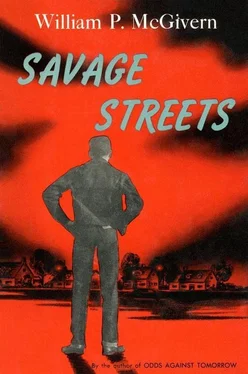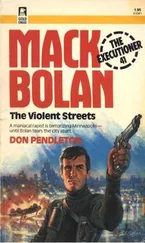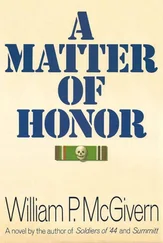When Farrell crossed Whiting Boulevard a few minutes later he entered a world of split-levels and ranch houses, of a mile of shops that modestly called itself “miraculous,” of gas stations and steak houses ablaze with neon, the world of the middle-class commuter, new, mortgaged and efficient, with television antennae flying like pennants above every man’s castle.
A half mile beyond Whiting Boulevard, Farrell came to the area known as Hayrack. Now he was nearly home. Hayrack was an incongruously run-down neighborhood, a square mile of deteriorating houses and shops pressed in tightly between the Faircrest development and the commercial section of Rosedale. It was not quite a slum area, but the streets were poorly lit, and there were several pool halls and a number of cheap, noisy barrooms. Hayrack had been a respectable, lower-middle-class community when the larger homes on the south shore had dominated the area. It had supplied the labor that kept the big houses running gracefully; maids and chauffeurs, stable boys and gardeners, all the essential props of privilege had come from Hayrack. When the big houses ceased to function, so had Hayrack. Now everyone said the whole area had to go; the land was needed for decent housing and the bars and pool halls were a disgrace. But so far nothing had been done. Hayrack continued to exist, held together by the complicated tendrils of politics, taxation and ethnic loyalties.
Farrell always experienced a certain tension as he walked through Hayrack. The street comers were dim and the alleys full of heavy shadows but his uneasiness was not a physical thing; he simply felt out of place in this neighborhood, a stranger, an alien.
After Hayrack he followed a street bordering the ninth fairway of the golf course, and this brought him to the arched entrance of the Faircrest development. There was a sentry box to the left of the arch, and beside this architectural irrelevancy stood a stone column with the name Faircrest spelled out in colored pebbles. Rows of willow trees stretched out in a long semicircle on either side of the archway, screening the development from the highway with soft, drooping branches.
Farrell passed under the arch and walked between the masses of rhododendron flanking the graveled entrance. He turned right at the first intersection. The homes he passed were identical in their snug, inexpensive feel of luxury; they stood on quarter-acre, well-tended lots, and came equipped with carports, barbecue pits, basement workshops, television antennae and combination washing and drying machines. In the twilight their picture windows gleamed warmly against the coming darkness. The scene was comfortable and familiar to his eyes. Glancing at the cars along the curbing he knew who was home, and who had missed a train or got tied up in the city. Some children were kicking a football around in the street and he recognized Billy Sims, Bobby Detweiller and Junior Norton. As he passed them the football bounced off the roof of a parked car and rolled along the sidewalk to his feet. He bent and scooped it up with one hand.
“Okay, who wants to go down under a long one?” He stepped off the sidewalk to the street. “Were trailing by three points, there’s time for just one play. Who’s going to be the hero?”
“Me, Mr. Farrell, me!” Bobby Detweiller shouted, pushing Junior Norton and Billy Sims aside. They protested shrilly, but Bobby was already trotting down the street. “Come on, throw it, Mr. Farrell,” he yelled. “Make it a good long one.”
As he drew back his arm to throw Farrell suddenly experienced an odd but directionless nostalgia for something he was at a loss to name or define. It was a confusing instant; there was the cold wind on his face, the touch of the smooth leather football in his hand, and an abrupt sense of emptiness and futility; it was all so long ago, he thought, and this was the first concept that isolated itself from the curious welter of self-pity. So damn long ago. For no understandable reason he thought of Union Station in Chicago at Christmas time, with the great illuminated tree centering the concourse and the music of carols booming against the high, vaulted ceiling. That was what Chicago looked like when you got off the University train for the Christmas vacation. The sweet, exciting music, the masses of people, the girls with pink cheeks and slim legs, the young men bigger and more confident than when they’d gone away in the fall, everyone shouting and happy in the rush for home.
“Throw it, Mr. Farrell!” Bobby Detweiller cried.
Farrell lobbed the ball carefully. The pass was good; it hit the boy’s upraised hands.
He dropped it and for some reason this pleased Farrell. Just like his old man, he thought.
“I couldn’t see it,” Bobby Detweiller said plaintively. “And it was too high. Throw me another one, Mr. Farrell. Just one more, please.”
“It’s too dark, I’m afraid. We’ll try it again tomorrow. Where’s Jimmy?”
“I don’t know,” Junior Norton said in his quick, eager little voice. He was thin and slenderly built, with his father’s dark good looks and cautious eyes. The Nortons had moved to Faircrest only a few months ago, and Farrell didn’t know Wayne Norton too well. He worked in a bank, and Farrell had the impression that he was vigilantly scenting the wind for the acceptable prejudices and taboos in his new environment. He said little, smiled a great deal, and was careful to take a straddling position in most discussions or arguments. Some of this wariness had obviously transmitted itself to his son, Wayne Jr., for the boy behaved with the youngsters in the development like a small edition of his father.
Billy Sims said, “Jimmy can’t play football any more. He’s studying or something.”
Farrell glanced at him closely; it was too dark to see the expression on his face, but there was a suggestion of illicit excitement in his voice. Farrell said, “What do you mean ‘Jimmy can’t play football any more’? Is he in the doghouse with his mother?”
Bobby Detweiller pushed the Sims boy from behind and said, “He doesn’t know anything, Mr. Farrell. He just blabbers all the time.”
“I do not,” Billy Sims cried and turned angrily on Detweiller’s son. “Jimmy told me he can’t play any more. He’s my friend, not yours. I should know, shouldn’t I?”
“He’s my friend just as much as he is yours,” Bobby Detweiller said very loudly, for this wasn’t true; Jimmy and Billy Sims had been playmates for a year or so before the Detweillers had moved to Faircrest.
“Well, let’s not quibble about it,” Farrell said and patted both boys on their shoulders. “I’ll ask Jimmy and settle the mystery myself. Take it easy now.” Farrell waved a good-by to the group of boys and went up the walk to his home. He hung up his hat and coat and turned into the small study that adjoined the foyer. The room was dark except for the television screen. His ten-year-old daughter, Angey, was sitting cross-legged on the sofa, her face pale and solemn in the faint illumination from the TV set. The program which held her transfixed was an animated cartoon featuring the clown named Boffo. Boffo’s reason for being, as nearly as Farrell could judge, was to sneak up behind people and strike them over the head with a huge club. Then he ran away to hide.
Angey didn’t turn her eyes from the screen. She said automatically, “Hi, Daddy. Please don’t turn on the light.”
“Just for a second.” He turned on a lamp and lifted the lid of the ice bucket. There was no ice. “You want to do me a favor, honey?”
“Oh, Daddy! ”
“I’ll keep my eye on Boffo for you. You run along and get me some ice.”
“Oh, all right,” she said, sliding from the sofa with childish grace, fluid and awkward at once.
Читать дальше












